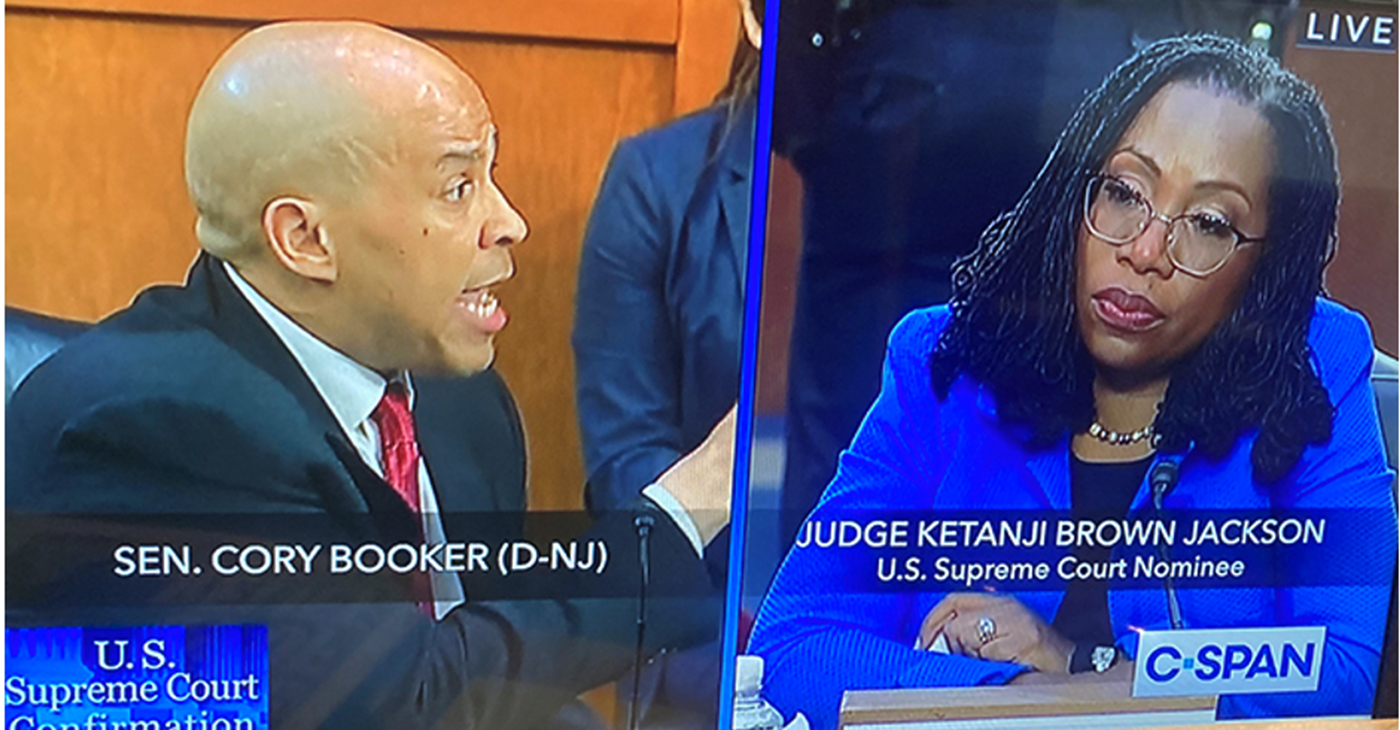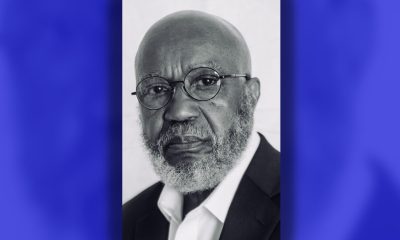Black History
COMMENTARY: Judiciary Committee Hearings Enough; Ketanji Brown Jackson Should Be on Supreme Court
“I do consider myself having been born in 1970 to be the first generation to benefit from the Civil Rights Movement,” said Judge Ketanji Brown Jackson. “From the legacy of all of the work of so many people that went into changing the laws of this country so that people like me could have an opportunity to be sitting here before you today.”

By Emil Guillermo
Watching four days of the Judiciary Committee Hearings on Ketanji Brown Jackson, I discovered we shared a few things. We were both debaters in high school. And we both did OO (Original Oratory) in the NFL. Football? No, National Forensics League. We both went to Harvard, too, though I was there 15 years earlier.
On the first day of the hearings, I was struck by the introduction given by one of her college roommates, Lisa Fairfax, now a law professor at the University of Pennsylvania. Fairfax talked about meeting Jackson in her freshman year. “Those first moments when you wonder if you belong,” Fairfax said. “She’s the friend that made sure we all did.”
Fairfax went on: “She was the role model who makes you believe in what she said, ‘You can do it and here’s how.’ And she showed us how, by the power of her example of hard work, preparation and excellence that transforms the seemingly impossible into the achievable.”
I wish I had that kind of college friend in my time in Cambridge. When I needed a pep talk, the best I got was, “Come on, Emil, let’s get a pizza.”
On Day 3 of the hearings, Jackson called herself, “a Black woman [and]lucky inheritor of the civil rights dream.”
With humility, she sounded like she understood the journey all people of color are on.
“I do consider myself having been born in 1970 to be the first generation to benefit from the Civil Rights Movement,” Jackson said. “From the legacy of all of the work of so many people that went into changing the laws of this country so that people like me could have an opportunity to be sitting here before you today.”
That was said before more of the onslaught from Senators Lindsey Graham, Ted Cruz, and Josh Hawley, Republicans all.
And if you watched it all like I did, you felt the impact of each attack.
So, when Democratic Sen. Cory Booker took his turn on Day 3, he provided reassuring comfort.
“You have earned this spot,” he said to Jackson, perhaps to help to ward off any self-doubt or a sense of “imposter syndrome” thoughts that may be lurking. “You are worthy. You are a great American.”
Booker was just warming up. As one of the last five senators to question Jackson, he was bringing it home. And it worked. Because I found I could totally relate to Jackson.
If you have experienced even the most minor transgression because of race in America, you know. Did you see yourself as she sat in the committee chamber? I did.
“There is a love in this country that is extraordinary,” Booker said to Jackson. Booker then referenced the racial segregation laws affecting Jackson’s family, as well as the laws that would have prevented her own marriage to a white man. The same anti-miscegenation laws that kept Asians like my Filipino father from marrying whites. “But [people] didn’t stop loving this country, even though this country didn’t love them back.”
That hit me.
It’s the reason Jackson was before the committee, Booker said. It was about all the people who came here and said, “I’m going to show this country that I can be free here, that I can make this country love me as much as I love it.”
And then Booker mentioned Asian Americans, specifically.
“Chinese Americans first forced into near slave labor building our railroads connecting our country saw the ugliest of America, but they were going to build their home here [and say] ‘America, you may not love me yet, but I’m going to make this nation live up to its promise and hope.’”
That statement infused a much-needed sense of diversity and inclusion and love, yes, that word, in a room that had been stripped of it by the preening Republicans.
“And so, you faced insults here that were shocking to me,” Booker said to Jackson. “But you are here because of that kind of love.”
People of color know the struggle of getting to where Jackson sits.
She’s in that seat for us.
As Booker talked, Jackson wiped her eyes.
And that’s all we really needed to know about the judge.
It’s good to know a nominee’s judicial philosophy. But we want to know they are human, too. That they have a heart. And that given individual circumstances, they can break the cookie-cutter and responsibly balance punishment with a sense of public forgiveness, a constructive empathy. If I had a vote, I would cast it in a second for Ketanji Brown Jackson. A vote for history.
Emil Guillermo is a journalist and commentator. His web talk show is on Facebook.com/emilguillermo.media; YouTube; and Twitter@emilamok
Activism
Oakland Post: Week of April 17 – 23, 2024
The printed Weekly Edition of the Oakland Post: Week of April 17 – 23, 2024

To enlarge your view of this issue, use the slider, magnifying glass icon or full page icon in the lower right corner of the browser window. ![]()
Black History
Matthew Henson: Explorer Extraordinaire
Matthew Henson, a trailblazing explorer who overcame countless obstacles to leave an incredible mark on history. Born on August 8, 1866, in Charles County, Maryland, his journey is a testament to the power of determination and the spirit of adventure.

By Tamara Shiloh
Matthew Henson, a trailblazing explorer who overcame countless obstacles to leave an incredible mark on history. Born on August 8, 1866, in Charles County, Maryland, his journey is a testament to the power of determination and the spirit of adventure.
Henson’s life began amidst the backdrop of post-Civil War America, where opportunities for African Americans were scarce. From a young age, he possessed an insatiable curiosity about the world beyond his small town. At the age of 12, he embarked on a journey that would change the course of his life forever when he joined a merchant ship as a cabin boy.
His most famous expedition was his journey to the Arctic with renowned explorer Robert E. Peary. In 1887, Henson joined Peary’s crew as a seaman and quickly proved himself to be invaluable with his skills as a navigator and craftsman. Over the course of several expeditions, Matthew endured extreme cold, treacherous terrain, and grueling conditions as he and Peary sought to reach the elusive North Pole.
In 1908–09, Peary set out on his eighth attempt to reach the North Pole. It was a big expedition, with Peary planning to leave supplies along the way. When he and Henson boarded their ship, the Roosevelt, leaving Greenland on August 18, 1909, they were joined by a large group. This included 22 Inuit men, 17 Inuit women, 10 children, 246 dogs, 70 tons of whale meat, blubber from 50 walruses, hunting gear, and tons of coal.
In February, Henson and Peary left their anchored ship at Ellesmere Island’s Cape Sheridan, along with the Inuit men and 130 dogs. They worked together to set up a trail and supplies along the way to the Pole.
Peary picked Henson and four Inuit people to join him in the final push to the Pole. However, before they reached their destination, Peary couldn’t walk anymore and had to ride in a dog sled. He sent Henson ahead to scout the way. In a later interview with a newspaper, Henson recalled being in the lead and realizing they had gone too far. The group turned back, and Henson noticed his footprints helped guide them to their destination. At that location, Henson planted the American flag.
Henson’s legacy extends far beyond his expeditions to the Arctic. He shattered racial barriers in the world of exploration and inspired countless individuals, regardless of race, to dream big and pursue their passions. In 1937, he was finally recognized for his achievements when he was inducted into The Explorers Club, an organization dedicated to promoting scientific exploration and field research.
Matthew Henson died in the Bronx, New York, on March 9, 1955, at the age of 88.
Art
Marin County: A Snapshot of California’s Black History Is on Display
The Marin County Office of Education, located at 1111 Las Gallinas Ave in San Rafael, will host the extraordinary exhibit, “The Legacy of Marin City: A California Black History Story (1942-1960),” from Feb. 1 to May 31, 2024. The interactive, historical, and immersive exhibit featuring memorabilia from Black shipyard workers who migrated from the South to the West Coast to work at the Marinship shipyard will provide an enriching experience for students and school staff. Community organizations will also be invited to tour the exhibit.

By Post Staff
The Marin County Office of Education, located at 1111 Las Gallinas Ave in San Rafael, will host the extraordinary exhibit, “The Legacy of Marin City: A California Black History Story (1942-1960),” from Feb. 1 to May 31, 2024.
The interactive, historical, and immersive exhibit featuring memorabilia from Black shipyard workers who migrated from the South to the West Coast to work at the Marinship shipyard will provide an enriching experience for students and school staff. Community organizations will also be invited to tour the exhibit.
All will have the opportunity to visit and be guided by its curator Felecia Gaston.
The exhibit will include photographs, articles and artifacts about the Black experience in Marin City from 1942 to 1960 from the Felecia Gaston Collection, the Anne T. Kent California Room Collection, The Ruth Marion and Pirkle Jones Collection, The Bancroft Library, and the Daniel Ruark Collection.
It also features contemporary original artwork by Chuck D of the Rock and Roll Hall of Fame group Public Enemy, clay sculptures by San Francisco-based artist Kaytea Petro, and art pieces made by Marin City youth in collaboration with Lynn Sondag, Associate Professor of Art at Dominican University of California.
The exhibit explores how Marin City residents endured housing inequities over the years and captures the history of plans to remove Black residents from the area after World War II. Throughout, it embodies the spirit of survival and endurance that emboldened the people who made Marin City home.
Felecia Gaston is the author of the commemorative book, ‘A Brand New Start…This is Home: The Story of World War II Marinship and the Legacy of Marin City.’ Thanks to the generous contribution of benefactors, a set of Felecia’s book will be placed in every public elementary, middle, and high school library in Marin.
In addition, educators and librarians at each school will have the opportunity to engage with Felecia in a review of best practices for utilizing the valuable primary sources within the book.
“Our goal is to provide students with the opportunity to learn from these significant and historical contributions to Marin County, California, and the United States,” said John Carroll, Marin County Superintendent of Schools.
“By engaging with Felecia’s book and then visiting the exhibit, students will be able to further connect their knowledge and gain a deeper understanding of this significant historical period,” Carroll continued.
Felecia Gaston adds, “The Marin County Office of Education’s decision to bring the Marin City Historical Traveling Exhibit and publication, ‘A Brand New Start…This is Home’ to young students is intentional and plays a substantial role in the educational world. It is imperative that our community knows the contributions of Marin City Black residents to Marin County. Our youth are best placed to lead this transformation.”
The Marin County Office of Education will host an Open House Reception of the exhibit’s debut on Feb. 1 from 4 p.m. – 6 p.m.. All school staff, educators, librarians, and community members are encouraged to attend to preview the exhibit and connect with Felecia Gaston. To contact Gaston, email MarinCityLegacy@marinschools.org
-

 Activism4 weeks ago
Activism4 weeks agoOakland Post: Week of March 20 – 26, 2024
-

 #NNPA BlackPress3 weeks ago
#NNPA BlackPress3 weeks agoCOMMENTARY: D.C. Crime Bill Fails to Address Root Causes of Violence and Incarceration
-

 #NNPA BlackPress4 weeks ago
#NNPA BlackPress4 weeks agoFrom Raids to Revelations: The Dark Turn in Sean ‘Diddy’ Combs’ Saga
-

 #NNPA BlackPress3 weeks ago
#NNPA BlackPress3 weeks agoMayor, City Council President React to May 31 Closing of Birmingham-Southern College
-

 #NNPA BlackPress4 weeks ago
#NNPA BlackPress4 weeks agoCOMMENTARY: Lady Day and The Lights!
-

 Activism3 weeks ago
Activism3 weeks agoOakland Post: Week of March 27 – April 2, 2024
-

 #NNPA BlackPress4 weeks ago
#NNPA BlackPress4 weeks agoBaltimore Key Bridge Catastrophe: A City’s Heartbreak and a Nation’s Alarm
-

 #NNPA BlackPress4 weeks ago
#NNPA BlackPress4 weeks agoBaltimore’s Key Bridge Struck by Ship, Collapses into Water



















































